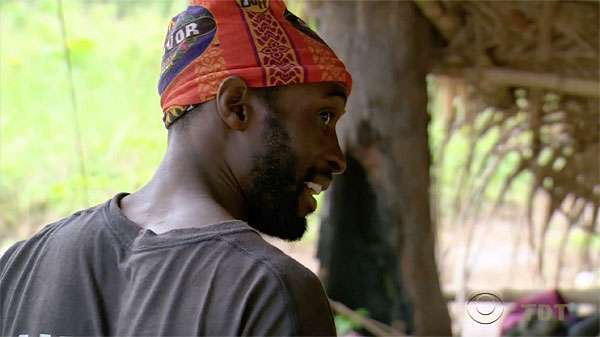

So Abi-Maria Gomes, the woman that for the last couple weeks, everyone assumed would be sitting in the final three come next Wednesday’s finale gets the boot. For some reason, a majority of the remaining players thought it was in their best interest to eliminate one person every single one of them could beat.
It’s a bit hard to figure, friends. Truly hard to figure.
With very few days remaining until the end, it makes no sense to me why Spencer, Jeremy and Tasha wouldn’t have taken the opportunity to get rid of a real threat. Of course, we heard them discussing how none of these other folks – besides Kimmi? – were real threats. So I don’t know.
How do we explain a move like this? I’m really not sure … at all. Why don’t we look toward, then, the theory of planned behavior? It seems to me, when things don’t work out the way that makes the most sense, it’s always best to explore people’s beliefs. You can usually figure out behavior that way.
Introduced to academia by University of Massachusetts professor of psychology Icek Aizen back in 1985, theory of planned behavior, in its simplest form, connects beliefs to behavior. It basically says there are two parts to enacting behavior: intent and control. We intend to do some things, but we don’t have control all the time. Then there are the perceptions of control we have. For everything possible, we perceive the difficulty or ease with which we can accomplish something. The theory calls this perceived behavioral control.
What does this all mean? Well, Aizen’s theory posits that intuitively we have beliefs of how likely we are to accomplish something and these beliefs shape our behavior. For example, when I was a kid I wanted to play professional baseball. But early on I knew this wasn’t in the cards. So even though I wanted to be the next Wade Boggs more than anything, I didn’t try too hard because I knew it wasn’t happening.
How we feel about a behavior also affects us. So, for example, if I like to do something and someone asks me to do it, I’m more likely to do it. Simple, right? In essence, the theory is one of the more complicated, if not the most complicated, one we’ve looked at this season because there are so many variables or parts to the theory. But, in reality, all we need to completely understand is that the theory of planned behavior argues that our beliefs, and societal norms, affect our behavior more than almost anything else.

So what does this have to do with the Abi vote-off? Well, the only reason I can think of for these four people to eliminate Abi comes down to that chat in the woods between Jeremy, Spencer and Tasha. While talking, they mentioned being voted in by the fans and not wanting to disappoint them by bringing a goat to the end.
I don’t know about you, but having kept her around for this long, I would consider it a good move to drag Abi to the end. That’s the play of a winner, of a great player. It wouldn’t impact my feelings about the other two final tribal contestants at all. But maybe the contestants believe otherwise?
And this brings us back to the theory. The four people who eliminated Abi not only believed it would be best to eliminate a goat because of societal norms, but they also perceived it as an easy vote. Deep down, they remembered Kelley pulling out an idol, so they thought she would be harder to vote off. That’s perceived behavioral control.
When looking at this move, it’s truly hard to understand. But we’re not out on the island. I can’t help but think there are a lot of perceptions impacting the players that we just don’t know about. And these perceptions, these beliefs, are clearly impacting behavior and forcing players, in my mind, to act in ways that are in opposition to the optimal ones, at least to me.
Enough with the theory of planned behavior, though. Let’s talk about who each remaining player needs to sit next to win this thing. Sound good? Well, I don’t know how you answered that question so, um, I’m just going to do it whether you like it or not. Sorry.
Orkun

- 1. Spencer — Spencer’s in a super-interesting spot right now. I don’t think there’s any way at all that he doesn’t pull of a win against basically anyone left in the game except, maybe, Jeremy. Yet, who’s he in an alliance with? Jeremy. As I talked about before, I think Spencer made a big mistake with his decision here, but I could be very wrong. Without a doubt, as I mentioned earlier in the season, the old Bayon folks certainly made a mistake keeping Spencer over Monica.
 2. Kelley — This is clearly a case where perception and reality may be very hugely different. I think the last time we saw something like this – and I could be very wrong – was with Sash in Nicaragua. For me and many others at home, I assume, Sash looked like a legitimately good player who had a real chance of winning. That’s not how it went down, though. Kelley is in a similar spot, I think. Did you all catch those conversations between Spencer, Jeremy and Tasha where they basically called Kelley a goat? And of course, we know that earlier in the game everyone was so focused on Ciera and not Kelley. So even though we at home see Kelley as a very good player this season, her perception with her fellow survivors, the ones who will vote on the winner, doesn’t seem so strong. I think Kelley needs a final three of Keith and Kimmi. Maybe she can beat Tasha too, but she definitely can’t be in there with Spencer or Jeremy.
2. Kelley — This is clearly a case where perception and reality may be very hugely different. I think the last time we saw something like this – and I could be very wrong – was with Sash in Nicaragua. For me and many others at home, I assume, Sash looked like a legitimately good player who had a real chance of winning. That’s not how it went down, though. Kelley is in a similar spot, I think. Did you all catch those conversations between Spencer, Jeremy and Tasha where they basically called Kelley a goat? And of course, we know that earlier in the game everyone was so focused on Ciera and not Kelley. So even though we at home see Kelley as a very good player this season, her perception with her fellow survivors, the ones who will vote on the winner, doesn’t seem so strong. I think Kelley needs a final three of Keith and Kimmi. Maybe she can beat Tasha too, but she definitely can’t be in there with Spencer or Jeremy.- 3. Keith — Keith’s another tough one in the sense I think everyone loves him, but this cast, I don’t think, won’t reward someone who coasted to the end without making moves. Keith certainly doesn’t make moves. I mean, maybe someone considers spitting a Big Move™? I guess a big move really is taking a chance. And where I’m from, spitting as much as Keith does, or spitting at all, you’d be taking a big chance that someone wouldn’t yell at you or something. I don’t know. Keith might have a chance against Kimmi and Kelley. But I doubt it. I think Keith basically has less than a 5% chance of pulling this off.
 4. Jeremy — Is Jeremy the only one in the game who can beat anyone? You have to figure he’s made one big move already. He’s got another one up his sleeve with the other idol. He’s well liked. He seemingly can communicate well and tell his winner’s narrative clearly. And he’s got a good story. When he sits up there and talks about coming to the island to help support his family, including an unborn son? Well, I feel like he wins. Everyone likes him. This is a huge key.
4. Jeremy — Is Jeremy the only one in the game who can beat anyone? You have to figure he’s made one big move already. He’s got another one up his sleeve with the other idol. He’s well liked. He seemingly can communicate well and tell his winner’s narrative clearly. And he’s got a good story. When he sits up there and talks about coming to the island to help support his family, including an unborn son? Well, I feel like he wins. Everyone likes him. This is a huge key.- 5. Kimmi — Is there a way Kimmi wins? Maybe. She’s got a good story, but she certainly doesn’t have any moves to her credit yet. Maybe she turns on Jeremy at some point and then she’ll have something to point to? It’s tough. Kimmi needs Spencer and Jeremy gone, and probably Tasha too. So, like Keith and Kelley, I think she needs to be in final three with those folks and then it’s about who can deliver the best final tribal. I can’t imagine her winning any other way.
- 6. Tasha — Well, I guess Tasha can now point to eliminating Abi as her Big Move™. I don’t know. Call me a purist or something, but I think to get credit for a move, it should be a good move. There’s no way ditching Abi was a good move for Tasha. There’s no way it was a really impactful move at all. Yeah, they got rid of a non-entity that would have gone to the final three, probably. Eh. Whatever. I think Tasha needs to ditch Jeremy and Spencer, so it’s clear they didn’t drag her to the end. If she can do that, she, I think, has the best chance to win of any of the remaining four. She may even be able to beat Spencer if she can clearly communicate her great work at Angkor. We’ll see.
It’s all over but the finale now. I don’t know about you, but I haven’t been this excited for a finale in a while. I’ll talk about where I think this season stands in terms of quality next week, but here’s to a great ending, OK?
 Pat Ferrucci started watching Survivor when episode two of Borneo first aired. He’s seen every episode since. Besides recapping here, he’ll be live-tweeting this season from the Mountain Time Zone. Why? Because nobody cares about the Mountain Time Zone except when they want to ski. Follow him @patferrucci for Survivor stuff and tweets about anything and everything that enters his feeble mind.
Pat Ferrucci started watching Survivor when episode two of Borneo first aired. He’s seen every episode since. Besides recapping here, he’ll be live-tweeting this season from the Mountain Time Zone. Why? Because nobody cares about the Mountain Time Zone except when they want to ski. Follow him @patferrucci for Survivor stuff and tweets about anything and everything that enters his feeble mind.
- Index of articles
- Pre-season preview
- Ep.1: Vytas, SIT down
- Ep.2: Varner teaches the Old School
- Ep.3: Tasha sets the Tribal agenda
- Ep.4: Abi continues cultivating an irrational gameplan
- Ep.5: Let's get ethical
- Ep.6: Follow the leader... or not
- Ep.7: Framing how it all went down
- Ep.8: Second Chance primed for an incredible end game
- Ep.9: Did Stephen just open or close the gate to winning?
- Eps.10-11: Construction junction, how do you function?
- Ep.12: Spiraling toward what could be an amazing end
- Ep.13: Planning behavior before the finale
- Ep.14: Wrapping up a stellar season